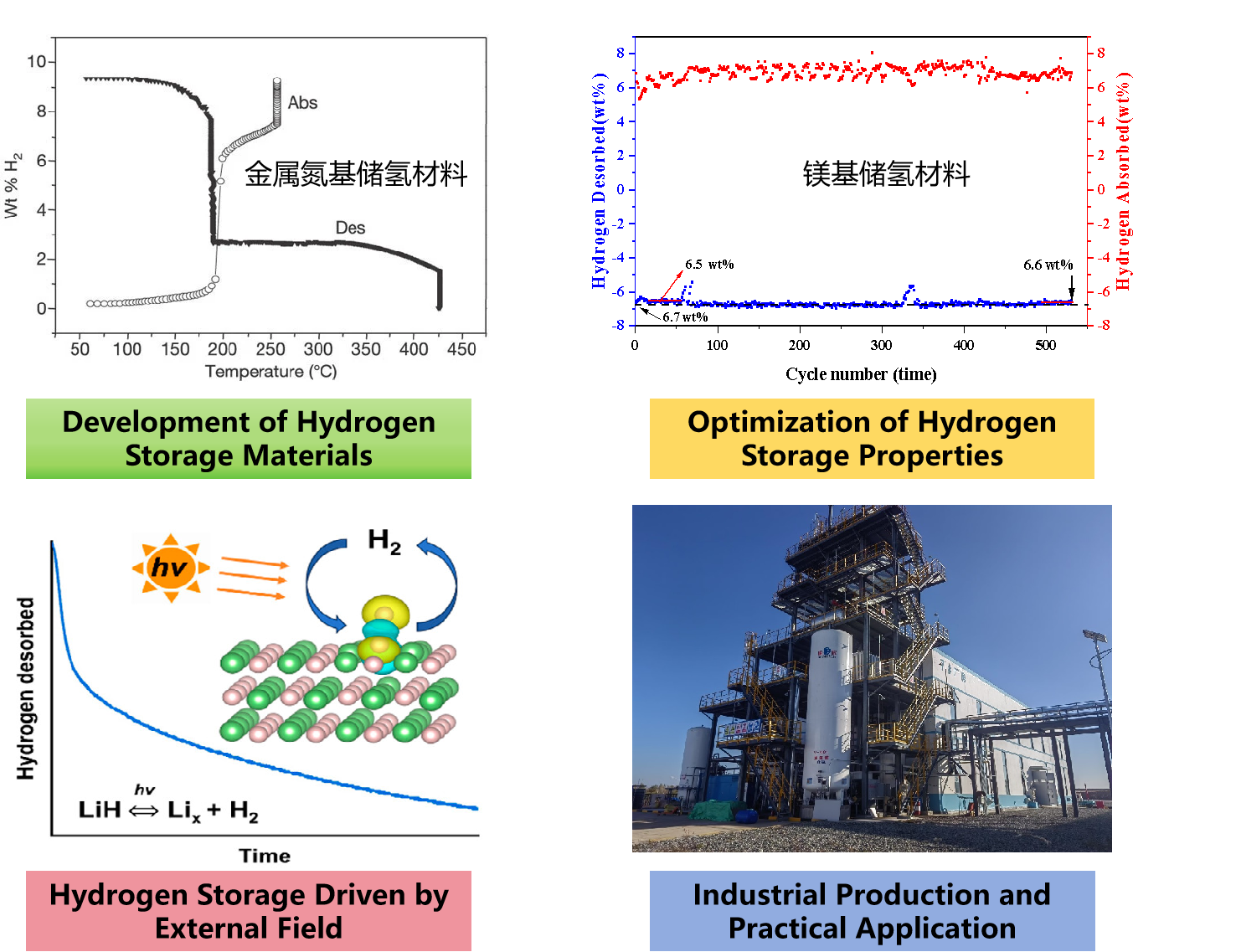
Research

Objectives:
Development of Hydrogen Storage Materials
l Materials Synthesis: The focus is on developing materials that exhibit high gravimetric and volumetric hydrogen storage densities, along with favorable thermodynamic and kinetic properties for de/re-hydrogenation.
l Properties Optimization: This involves the development of highly efficient additives to lower de/re-hydrogenation temperatures by enhancing reaction kinetics or/and optimizing reaction thermodynamics.
l Mechanisms Investigation: This aims to elucidate how compositions, structures, catalysts, and additives influence hydrogen storage properties.
Development of Novel Hydrogen Storage System Assisted by External Field
l Systems Design and Properties Optimization: This entails developing innovative hydrogen storage materials and systems by understanding the interactions between various external fields (e.g., light, microwave, electric field) and hydrogen storage materials.
l Mechanisms Study: This involves investigating the reaction mechanisms between external fields and hydrogen storage materials.
Hydrogen Storage Applications
l Materials Scale-up: The objective is to develop and optimize production processes for hydrogen storage materials, and to reduce manufacturing costs and increase production capacity.
l Systems Application: The goal is to develop hydrogen storage systems for various applications, minimizing energy use and costs.
Other Applications of Hydrogen Storage Materials
l The aim is to investigate and expand the diverse applications of hydrogen storage materials, including ion conduction, hydride ion batteries, and thermal energy storage.
Why?
l Development of Hydrogen Storage Materials: High thermodynamic and kinetic barriers currently hinder the practical use of high-capacity solid-state hydrogen storage.
l External Field-Assisted Hydrogen Storage Systems: Reversible hydrogen storage using external heating, typically via electricity, suffers from high energy input and operating costs, reducing storage density and system efficiency.
l Hydrogen Storage Applications: Solid-state hydrogen storage systems have yet to transition from the laboratory settings to commercial applications.
Challenges:
l Development of Hydrogen Storage Materials: A key challenge in this field is developing hydrogen storage materials that can simultaneously have low operating temperatures and high hydrogen capacities.
l Development of Novel Hydrogen Storage Systems Assisted by External Fields: The precise interaction mechanisms between external fields and hydrogen storage materials are not yet fully understood, necessitating further research to elucidate these mechanisms and advance hydrogen storage technologies.
l Hydrogen Storage Applications: Hydrogen storage materials impose stringent requirements on production environments, including controlled atmosphere, pressure, and other parameters. Addressing these challenges is essential for achieving scalable and cost-effective mass production. Additionally, effective thermal management is critical for optimizing the energy efficiency of hydrogen storage systems.
Vision:
l Development of Hydrogen Storage Materials: The focus is on developing hydrogen storage materials with superior overall performance to meet the specific requirements of vehicle-mounted hydrogen storage systems and other application scenarios.
l Development of Novel Hydrogen Storage Systems Assisted by External Fields: Investigate the interaction mechanisms between external fields and hydrogen storage materials, aiming to fully utilize renewable energy sources to drive hydrogen storage processes.
l Hydrogen Storage Applications: Develop and implement hydrogen storage materials to facilitate the gradual replacement of fossil fuels as the primary energy source for human activities.
Papers
Nature, 2002, 420: 302-304
Advanced Materials, 2004, 16: 1522-1524
Nature Materials, 2008, 7(2): 138-141
Advanced Energy Materials, 2017, 7(13): 1602456
Journal of Materials Chemistry A, 2023, 11: 11748-11754
Small, 2022, 19: 2206518
The Journal of Physical Chemistry Letters, 2024, 15: 6662-6667
Reviews and perspectives
Advanced Materials, 2019, 31(50): 1902757
Accounts of Materials Research, 2021, 2: 726-738